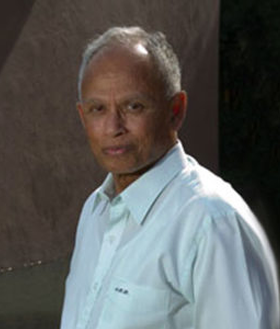heading
2006: Asit K. Biswas
While many water experts have through the years contributed highly effective methodologies to the rational use and management of water resources, Professor Asit K. Biswas – the Indian-born Canadian – fostered a new “socio-economic and political climate“ which enabled the effective translation of scientific (both natural and social) and technical advances into meaningful measures.

His role as a global facilitator of international platforms where organisations and individuals can take concrete action on water, has taken many forms.
As the main scientific advisor to the Secretary-General of the United Nations Water Conference in Mar del Plata, Argentina, in 1977, Professor Biswas helped to formulate and promote the International Water Supply and Sanitation Decade. After approval of this initiative by the UN General Assembly, Professor Biswas advised international and national institutions on how the Decade could be implemented. During the Decade, strides were made in finding affordable technologies and participatory approaches to help serve those without access to improved water and sanitation services. In another example, Professor Biswas, together with the former UN Undersecretary-General, Dr. Peter Hansen, reviewed the work of all the UN agencies for the Mar del Plata Conference and advised on how the impact of their water-related activities could be maximised.
“I have a final dream that every one of the world’s citizens will live in a water secure world within my lifetime,” he said. “This is not an impossible dream but an achievable dream. If we fail, as Shakespeare has said in Julius Caesar ‘The fault, dear Brutus, is not in our stars, but in ourselves that we are underlings.”
Believing water is a source of collaboration and not conflict, Professor Biswas chaired the Middle East Water Commission from 1993 to 1997, with the support of the Sasakawa Peace Foundation. He managed to involve high-level personalities from most countries in the region to review and assess the water problems face to face. The actual treaties on water issues between several countries were based on many of the recommendations of this Commission. Finally, his concern with the fact that potential water leaders of the next generation are not being heard at major international forums inspired Professor Biswas to initiate a 3-year programme with the support of the Nippon Foundation, to select and mentor potential water leaders from all over the world under 40 years.
“I have a final dream that every one of the world’s citizens will live in a water secure world within my lifetime.”
Many of his additional activities have also resulted in outstanding contributions to solve international and regional water problems. Professor Biswas has acted as an advisor and confidant to policymakers in water and environmental management in 17 countries, to six heads of United Nations agencies and to other intergovernmental and international organisations. The Third World Centre for Water Management, a “think tank“ initially set up by Professor Biswas to give independent and authoritative policy and knowledge support to developing countries, also regularly advises many industrialised countries. Professor Biswas founded the International Journal of Water Resources Development and has been involved in the writing of 64 books on many water-related topics. He also published over 600 scientific and technical articles (mostly on interdisciplinary topics). Impressively, his work has been translated into 31 languages.
Professor Biswas speaks convincingly of how forces like globalisation, free trade, the information and communication revolution, accelerated quests for energy security, technological developments, population growth and urbanisation are not only unprecedented in human history, they are also changing the boundary conditions of water management.
While in Stockholm to receive the Prize, the uncanny ability of Professor Biswas to move an audience showed itself once again when he eloquently expressed his “dreams” for the future.